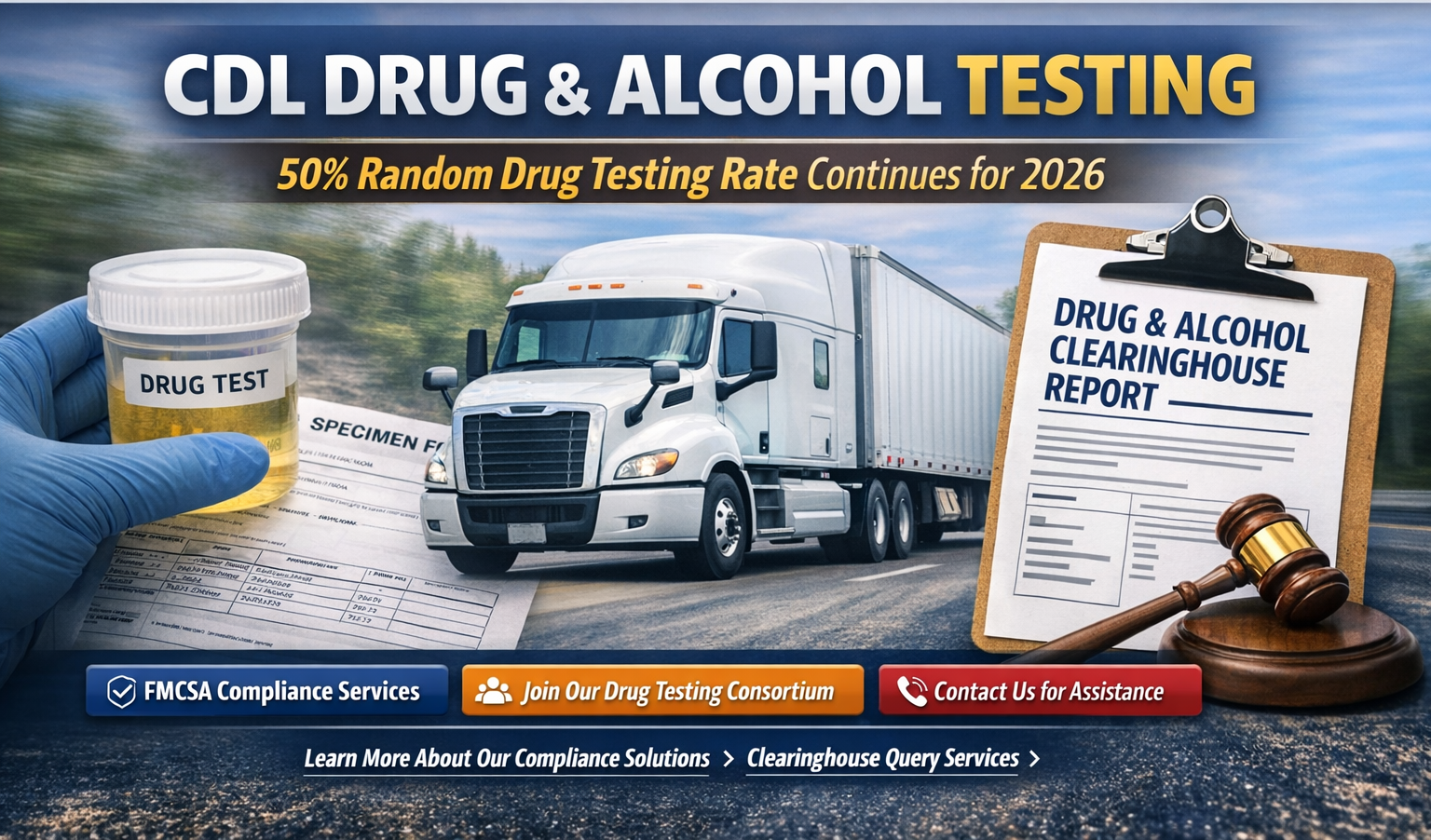Common Dot Violations: A Complete Guide
June 11, 2025
Share this article:
What Are DOT Violations and Why They Matter
DOT violations are breaches of regulations set by the Department of Transportation (DOT) and the Federal Motor Carrier Safety Administration (FMCSA). These rules govern the safe operation of commercial motor vehicles and cover everything from driver behavior to vehicle maintenance.
Violations can occur during roadside inspections, audits, or accident investigations. Some may seem minor, but even small infractions can have serious consequences. Repeated or severe violations can lead to fines, increased insurance costs, loss of operating authority, and damage to a company’s reputation.
Understanding DOT violations is critical for fleet operators and drivers. Staying compliant helps protect the safety of the roadways and shields businesses from costly penalties and operational disruptions.
Top 10 Most Common DOT Violations
Some DOT violations appear more frequently during inspections and audits. Focusing on these areas helps fleet managers and drivers reduce risk and stay compliant.
Each violation not only leads to fines but also damages a company’s safety record and increases liability.

01. Brake system issues
Faulty or poorly maintained brakes are a major safety concern.
02. Tire Problems
Worn, underinflated, or damaged tires can result in out-of-service orders.
03. Lighting defects
Broken headlights, taillights, or turn signals are common failures.
04. Hours of Service (HOS) violations
Exceeding driving limits or inaccurate logs lead to fines.
05. Driver’s license violations
Expired, suspended, or improper licenses disqualify drivers.
06. Load securement failures
Unsecured cargo increases accident risks and inspection failures.
07. Missing driver qualification files
Incomplete records trigger penalties during audits.
08. Medical certificate lapses
Drivers must carry a valid Medical Examiner’s Certificate (MEC).
09. ELD non-compliance
Improper use of Electronic Logging Devices results in citations.
10. Insurance issues
Lapsed or insufficient insurance coverage is a major violation.
Driver-Related Violations: Fatigue, Licensing, and More
Many DOT violations are directly tied to driver behavior and compliance. Fatigue, improper licensing, and medical issues are among the most common causes.
Fatigue violations happen when drivers exceed their permitted Hours of Service (HOS). Driving beyond legal limits leads to dangerous conditions on the road and heavy penalties. Proper scheduling and real-time monitoring can help reduce fatigue-related risks.
Licensing violations occur when drivers operate without a valid or proper Commercial Driver’s License (CDL). Whether it is an expired license or a missing endorsement, these violations put drivers and companies at risk of fines and disqualification.
Medical violations result from expired or missing Medical Examiner’s Certificates (MECs). Drivers must undergo periodic medical evaluations to confirm they are fit to operate commercial vehicles safely.
Paying close attention to driver qualifications, health, and hours can prevent many of the most damaging DOT violations.
Vehicle Maintenance Violations to Watch For
Poor vehicle maintenance is a leading cause of DOT violations. Commercial vehicles must meet strict safety standards, and failure to perform regular inspections and repairs can quickly lead to citations.
Routine inspections and preventive maintenance programs help catch these issues before they become violations. Addressing maintenance needs promptly not only keeps vehicles compliant but also extends their lifespan and improves road safety.
Common maintenance-related violations include:
- Brake system defects: Worn or improperly adjusted brakes are one of the most frequent and serious issues.
- Tire violations: Bald or damaged tires increase the risk of blowouts and accidents.
- Lighting failures: Broken or non-functioning lights reduce vehicle visibility and signal effectiveness.
- Steering system problems: Faulty steering components compromise control and safety.
- Leaking fluids: Oil, coolant, or fuel leaks can result in environmental hazards and fines.
Hours of Service (HOS) and ELD Compliance Pitfalls
Hours of Service (HOS) regulations are designed to prevent driver fatigue, but they remain one of the most common areas for DOT violations. Staying compliant requires more than following time limits; it also involves accurate recordkeeping.
Electronic Logging Devices (ELDs) are required to track HOS, but many violations happen when drivers misuse devices or fail to keep them properly updated.
Common pitfalls include:
Logging inaccurate start and stop times
Failing to maintain backup copies of ELD data
Using non-compliant ELD systems
Skipping required edits and annotations for logbook corrections
HOS and ELD violations are costly and can raise concerns during audits and inspections. Consistent training and regular reviews of ELD data help prevent compliance issues.
How DOT Violations Impact Your CSA Score and Business
DOT violations do more than result in fines. They directly affect a carrier’s CSA (Compliance, Safety, Accountability) score, a critical metric that reflects the overall safety and reliability of a fleet.
The FMCSA uses CSA scores to prioritize carriers for inspections and interventions. A high number of violations can lower your score, making your company a target for audits and investigations. Poor scores can also drive up insurance premiums and make it harder to secure contracts with shippers who monitor safety ratings.
Beyond regulatory consequences, repeated violations damage your company’s reputation. Clients and partners often view a strong safety record as a sign of reliability and professionalism. Keeping DOT violations in check protects your CSA score and supports long-term business success.
Preventing DOT violations starts with building a culture of safety and compliance. Regular training, thorough inspections, and proactive recordkeeping help fleets avoid common pitfalls.
Focus on key areas such as maintaining up-to-date Driver Qualification Files, scheduling routine vehicle maintenance, monitoring Hours of Service through compliant ELDs, and conducting internal audits. Addressing small issues early prevents them from becoming costly violations later.
Investing in compliance management tools can make a significant difference. Automation helps track deadlines, manage documents, and identify risks before they lead to penalties.
National Fleet Services offers expert compliance support and DOT-focused solutions designed to keep your fleet audit-ready. Contact us today to learn how we can help you reduce risk, avoid violations, and protect your business.
fleet insights







